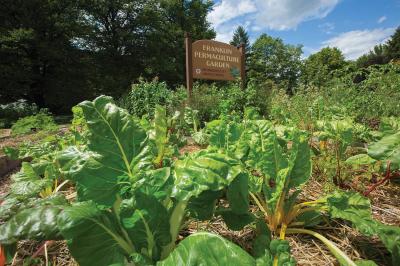Gardens are highlighted by USDA Climate Hubs

Credit: UMass Amherst
To educate and inspire people about how to farm and garden sustainably in the Northeast, three student-led permaculture gardens at the University of Massachusetts Amherst are now featured in vivid and interactive, 360-degree splendor on the USDA’s Climate Hubs website.
“It is a great project,” says Christine Hatch, extension associate professor of geosciences, part of the School of Earth and Sustainability, and UMass Amherst’s liaison to the USDA Climate Hubs. “The USDA picked this innovative 360 tool to highlight these climate adaptations in agriculture in a fun way that is engaging to a diverse range of stakeholders.”
The Climate Hubs’ mission is to develop science-based information and technologies, specific to different regions of the country, that lead to climate-informed decisions. The information helps farmers, ranchers, forest landowners, resource managers and rural communities manage risks associated with climate and weather. UMass Amherst is part of the Northeast Climate Hub, which partnered with the University of Delaware to create the web-based interactive media.
Permaculture is a set of increasingly popular ecological design principles used to create working landscapes that model natural ecosystems. It’s a philosophy of observing and working mindfully to follow nature’s lead.
The UMass Amherst Climate Hub website features the Franklin, Berkshire and Hillside gardens, key components of the UMass Amherst Permaculture Initiative, which grew out of students’ efforts to turn underused areas on campus into low-maintenance, edible gardens. It’s now funded by the university and part of UMass Dining.
Videos, photos and informative text are embedded in the 360 image of each garden, offering details about the gardens’ sustainable practices. “A broad range of climate-adaptive practices are used throughout the permaculture gardens, ranging from water reuse and conservation to improvements in soil health and resilience to crop biodiversity,” Hatch explains.
An information icon in the Franklin overview highlights water management – how the clay-lined pond catches rainwater and pumps it through underground pipes toward the plant beds. The garden also has cisterns that catch and store rainwater.
The permaculture site also highlights how keeping the gardens’ soil covered with plants or mulch as much of the year as possible is both adaptive and carbon-mitigating. This practice creates a sponge-like “container” for water and soil, giving water a place to go during intense rainstorms.
The gardens also are planted with no or little tilling, which preserves soil organic matter and structure. “When you plow a field, you’re releasing carbon in the form of carbon dioxide,” explains Daniel Bensonoff, the gardens’ sustainability coordinator, who works regularly with students. “No-till techniques not only keep carbon locked up in the soil, but they can also sequester atmospheric carbon through natural biological processes.”
The gardens are rich in diversity – some 200 plant species – and layers of perennial plants penetrate deep into the soil, offering climate resilience from drought and flood. Maintaining living roots in the soil throughout the garden year-round also promotes soil health and better crop yields.
When it’s time to harvest, UMass Amherst students gather some 1,600 pounds of produce from the gardens that is served in university dining commons. Although it’s a tiny fraction of the food consumed at the university, it has an outsize impact, Hatch and Bensonoff say, because the gardens function as both outdoor classrooms and research and demonstration sites that spread the news that permaculture is fitting for very small home gardens and large institutional ones alike.
“We want people to realize that climate change goes far beyond fossil fuels,” Bensonoff says. “One of the greatest opportunities we have to mitigate and reverse climate change is by changing our relationship to our landscapes.”
###
Media Contact
Patty Shillington
[email protected]
Original Source
https:/




